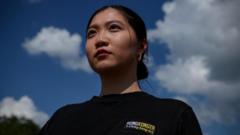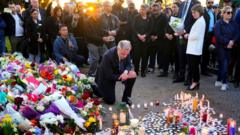Joe Tay, an actor and journalist, running for a seat in Canada’s federal election on Monday, has adopted an unusually subdued campaign approach due to significant safety concerns. The Chinese government has issued a warrant for his arrest and placed a bounty of $130,000 for information leading to his apprehension, primarily because of Tay's vocal criticism of its policies, particularly regarding Hong Kong’s diminishing democratic freedoms.
As a candidate in Toronto’s Don Valley North, home to a substantial Chinese diaspora, Tay has chosen not to engage with voters directly in traditional campaigning methods, such as door-knocking or attending public events. His decision to campaign quietly reflects both the pressure he faces domestically and the threats from abroad, particularly from entities aligned with the Chinese government.
In a revelation made just days before the election, Canadian officials disclosed that Tay is also the target of organized online campaigns designed to undermine his candidacy. These attacks, linked to the People’s Republic of China (P.R.C.), portray Tay as a criminal and actively suppress information about his campaign, according to Vanessa Lloyd, head of Canada’s intelligence agency. The efforts are viewed as an attempt to intervene in the electoral process in one of Canada’s most politically pivotal regions.
The unfolding situation highlights the intersection between international relations and local politics, with Tay's candidacy becoming a litmus test for Canada's approach to foreign interference in its elections, especially concerning the actions of the Chinese government. With a critical election looming, Tay's experience emphasizes the risks faced by political figures who challenge powerful states.


















